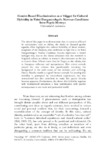Mostrar o rexistro simple do ítem
Gender-Based Discrimination as a Trigger for Cultural Hybridity in Tsitsi Dangarembga’s Nervous Conditions
| dc.contributor.author | Pagola Montoya, Irene | |
| dc.date.accessioned | 2016-07-15T08:35:32Z | |
| dc.date.available | 2016-07-15T08:35:32Z | |
| dc.date.issued | 2008 | |
| dc.identifier.citation | AEDEAN 2008, 31: 645-655 ISBN-978-84-9749-278-2 | |
| dc.identifier.isbn | 978-84-9749-278-2 | |
| dc.identifier.uri | http://hdl.handle.net/2183/17078 | |
| dc.description.abstract | [Abstract] The aim of this paper is to demonstrate that, in contexts affected by colonisation such as Africa, the desire to demand gender equality often highlights the cultural hybridity of those women, daughters of the diaspora, who undertake to fight for it. In Tsitsi Dangarembga’s Nervous Conditions, Nyasha represents a hybrid teenager that, due to the liberal education that she received in England, refuses to submit to women’s discrimination as the key to recover those African roots that she forgot, as she admits, due to European influence and manipulation. This critical attitude toward the two cultures that paradoxically constitute her background is the main cause of her isolation and suffering. Hence, Nyasha stands as a good literary example for proving that hybridity is prompted by intercultural experiences, but that womanhood can also contribute to make this special identity become apparent. Furthermore, she shows that hybridity together with womanhood constitute a fatal combination with painful consequences in our racist and patriarchal world. | |
| dc.language.iso | eng | |
| dc.publisher | Universidade da Coruña | |
| dc.title | Gender-Based Discrimination as a Trigger for Cultural Hybridity in Tsitsi Dangarembga’s Nervous Conditions | |
| dc.type | info:eu-repo/semantics/conferenceObject | |
| dc.rights.access | info:eu-repo/semantics/openAccess |






